15 Best Christmas Poems to Read for a Festive Holiday Season (original) (raw)
Recite these cozy Christmas poems to share the holiday spirit and make even your Grinchiest loved ones say, "Ho, ho, ho!"
Now Trending
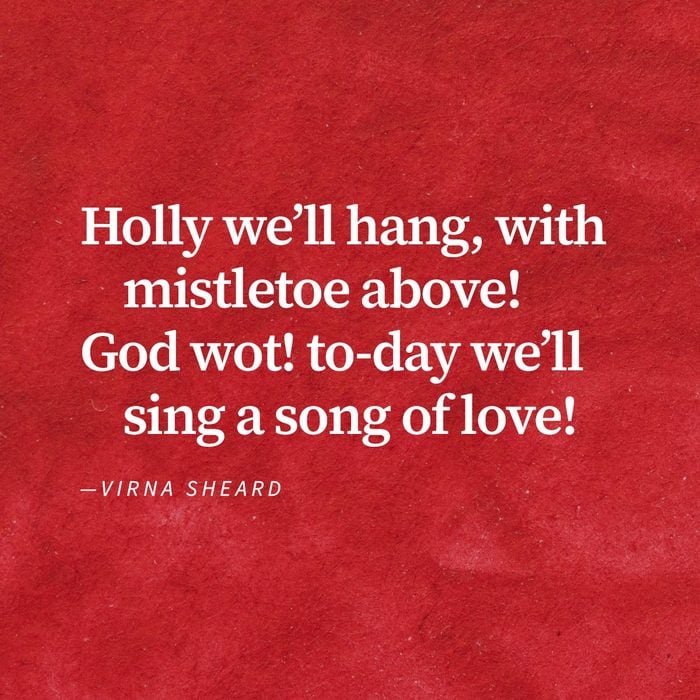
RD.COM, GETTY IMAGES
Christmas poems to put you in a festive mood
Snow-tipped chimneys, fresh pine, lively carols and gifts wrapped with care: For over a century, Christmas poems have captured the magic of the most wonderful time of the year. While many people celebrate Christmas as a Christian holiday centered around the birth of Jesus Christ, it has become a winter solstice holiday as well, celebrated by millions of people all around the world. No other season evokes such joy, love and wistful nostalgia, and we’ve selected 15 Christmas poems that perfectly capture all those sentiments with a pretty ribbon on top.
So bring some literary festivity to your handwritten Christmas cards, or add another fun activity to your family’s Christmas traditions, by reading these poems together over hot cocoa by the fire. Worried poetry might put Grandma to sleep too early? We’ve got you covered with both short poems and excerpts, as well as famous poems and underappreciated works. No matter what you pick, these merry verses will bring you and your loved ones closer together, which is what Christmas is all about!
Get _Reader’s Digest_’s Read Up newsletter for more poetry, humor, cleaning, travel, tech and fun facts all week long.
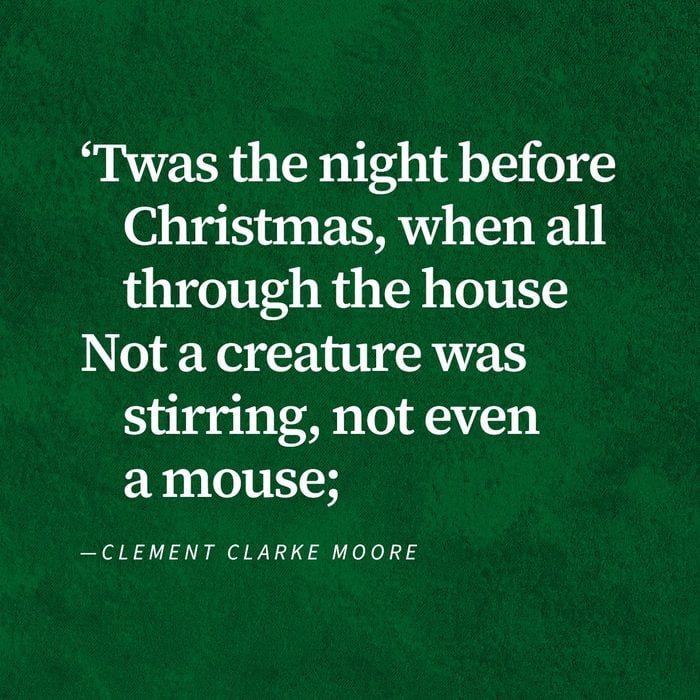
rd.com, Getty Images
1. “A Visit from St. Nicholas” by Clement Clarke Moore
‘Twas the night before Christmas, when all through the house
Not a creature was stirring, not even a mouse;
The stockings were hung by the chimney with care,
In hopes that St. Nicholas soon would be there;
The children were nestled all snug in their beds;
While visions of sugar-plums danced in their heads
The most famous of all Christmas poems, “A Visit from St. Nicholas” (aka the “‘Twas the Night Before Christmas” poem) is generally credited with popularizing the version of Santa Claus we know now, along with several other Christmas Eve traditions. The poem is told from the perspective of a father who, after his family goes to sleep on Dec. 24, spies a jolly, rosy-cheeked old man in a reindeer-pulled sleigh filled with toys for the children.
Anonymously published in 1823, the poem’s authorship by American poet Clement Clarke Moore is still debated, but it’s undeniable that this poem’s legacy lives on as adaptations into Christmas books, songs and even movies. Make sure to read the entirety of the poem with your little ones to get them ready for Santa’s arrival!
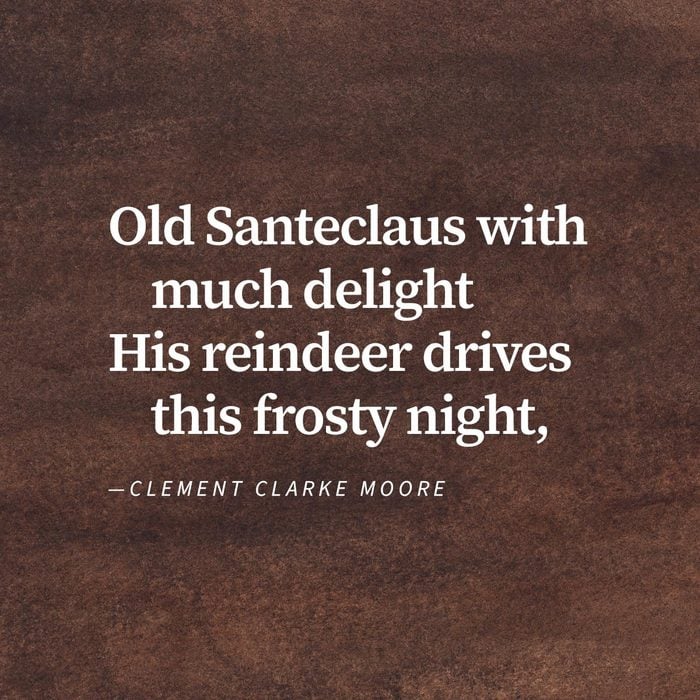
rd.com, Getty Images
2. “Old Santeclaus” by Clement Clarke Moore
Old Santeclaus with much delight
His reindeer drives this frosty night,
O’er chimney-tops, and tracks of snow,
To bring his yearly gifts to you.
The steady friend of virtuous youth,
The friend of duty, and of truth,
Each Christmas eve he joys to come
Where love and peace have made their home.
As he did in “A Visit from St. Nicholas,” Clement Clarke Moore focused on the more secular aspects of Christmas with the legend of “Old Santeclaus,” a poem that details the delightful toys Santa brings to “good girls or boys.” It’s important to note the poem does have a darker ending for naughty children who do not listen to their parents (it was the 19th century, after all). You can read the full poem, but you may prefer these cheerier children’s Christmas books as an alternative.
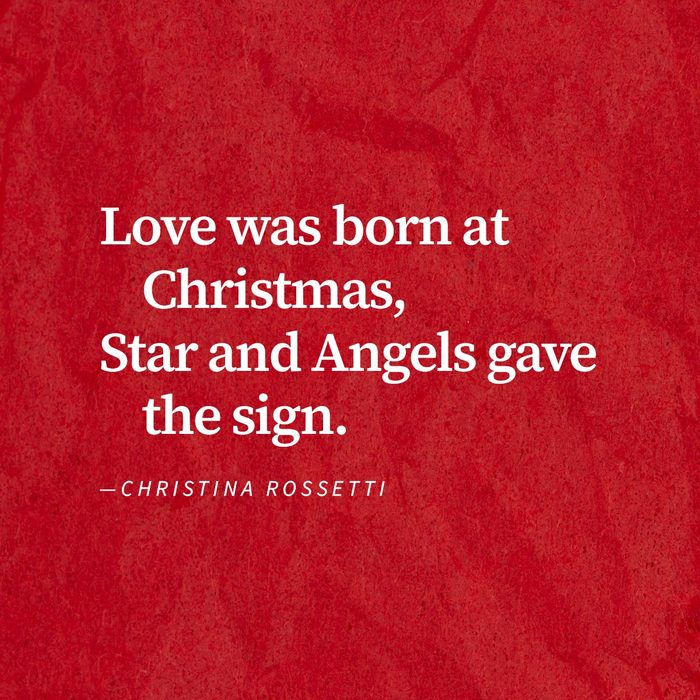
rd.com, Getty Images
3. “Love Came Down at Christmas” by Christina Rossetti
Love came down at Christmas,
Love all lovely, Love Divine,
Love was born at Christmas,
Star and Angels gave the sign.
Worship we the Godhead,
Love Incarnate, Love Divine,
Worship we our Jesus,
But wherewith for sacred sign?
Love shall be our token,
Love be yours and love be mine,
Love to God and all men,
Love for plea and gift and sign.
So much more than just a muse for the Pre-Raphaelites, 19th-century English poet Christina Rossetti is remembered for her love poems, religious poems and poems for the grieving. Rossetti’s “Love Came Down at Christmas” has simple verses that equate the birth of Jesus Christ as love sent from heaven itself, but it’s this simplicity that makes the poem so sweet and memorable—so much so that it has been adapted into a popular Christmas carol.
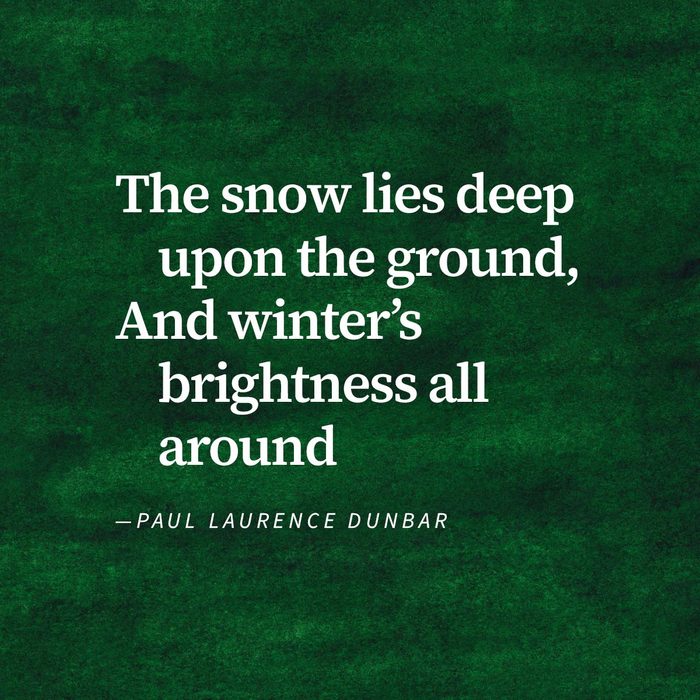
rd.com, Getty Images
4. “Christmas in the Heart” by Paul Laurence Dunbar
The snow lies deep upon the ground,
And winter’s brightness all around
Decks bravely out the forest sere,
With jewels of the brave old year.
The coasting crowd upon the hill
With some new spirit seems to thrill;
And all the temple bells achime.
Ring out the glee of Christmas time.
In happy homes the brown oak–bough
Vies with the red–gemmed holly now;
And here and there, like pearls, there show
The berries of the mistletoe.
A sprig upon the chandelier
Says to the maidens, “Come not here!”
Even the pauper of the earth
Some kindly gift has cheered to mirth!
Within his chamber, dim and cold,
There sits a grasping miser old.
He has no thought save one of gain,—
To grind and gather and grasp and drain.
A peal of bells, a merry shout
Assail his ear: he gazes out
Upon a world to him all gray,
And snarls, “Why, this is Christmas Day!”
No, man of ice,—for shame, for shame!
For “Christmas Day” is no mere name.
No, not for you this ringing cheer,
This festal season of the year.
And not for you the chime of bells
From holy temple rolls and swells.
In day and deed he has no part—
Who holds not Christmas in his heart!
Paul Laurence Dunbar was born in 1872 to American parents who had been enslaved, and he eventually became one of the first internationally recognized Black poets, publishing dozens of poetry books in his short lifetime (he died in 1906). His poem “Christmas in the Heart” describes the “glee of Christmas time,” and how it’s a season for kindness and cheer, not for greed or drear.
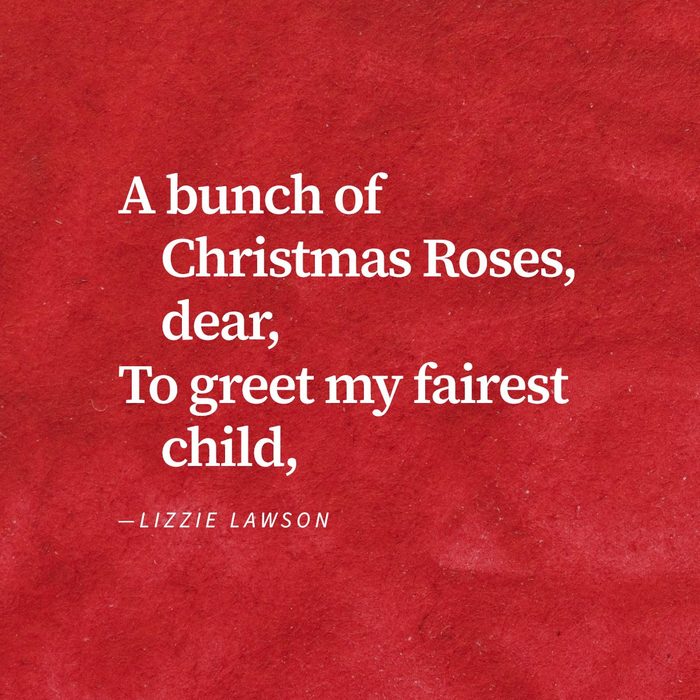
rd.com, Getty Images
5. “Christmas Roses” by Lizzie Lawson
A bunch of Christmas Roses, dear,
To greet my fairest child,
I plucked them in my garden where
The drifting snow lay piled.
I cannot bring thee violets dear,
Or cowslips growing wild,
Or daisy chain for thee to wear,
For thee to wear, my child.
For all the grassy meadows near
Are clad with snow, my child;
Through all the days of winter drear
No ray of sun has smiled.
I plucked this bunch of verses, dear,
From out my garden wild,
I plucked them in the winter drear
For you, my fairest child,
Your wet and wintry hours to cheer,
They’re Christmas Roses, child.
In Lizzie Lawson’s “Christmas Roses,” the narrator describes picking roses out of the snow for their child during a time of year when flowers can’t grow. But unlike those in most nature poems, the roses turn out to be the verses of the poem themselves, a sweet gift to cheer up the child on a dreary winter day.
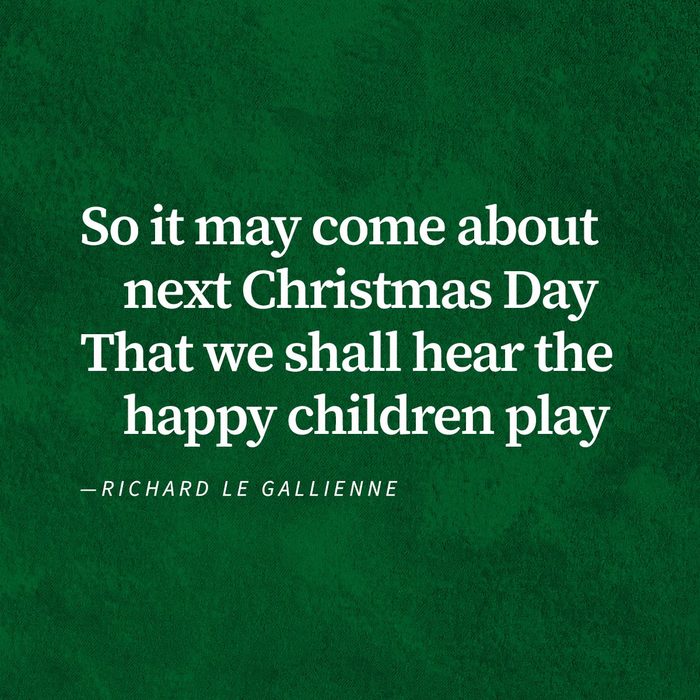
rd.com, Getty Images
6. “Christmas in War Time” by Richard Le Gallienne
O pray with all your hearts that war may cease,
And who knows but that God may hear the prayer.
So it may come about next Christmas Day
That we shall hear the happy children play
Gladly aloud, unmindful of the dead,
And watch the lovers go
To the old woods to find the mistletoe.
It can be difficult to partake in festivities when we know people are suffering, a sentiment English author and poet Richard Le Gallienne captures in the poem excerpted above. Written in 1899 during the Boer War, the poem starts by declaring “This is the year that has no Christmas Day” and stating that the children must play softly and the lovers must leave the mistletoe in the woods and save the holly whose “berries are too red” for next year. “Christmas in War Time” is a sobering poem that points out that Christmas colors are reminiscent of blood and calls for awareness of the lives that have been lost. Yet it’s also hopeful, asking for prayers for peace and an end to all war.

rd.com, Getty Images
7. “Christmas Afterthought” by James Whitcomb Riley
After a thoughtful, almost painful pause,
Bub sighed, “I’m sorry fer old Santy Claus:—
They wuz no Santy Claus, ner couldn’t be,
When he wuz ist a little boy like me!”
American writer and poet James Whitcomb Riley (1849–1916) is best known for writing in the unique Midwestern dialect and penning the poem “Little Orphant Annie” in 1885, which inspired the “Little Orphan Annie” comic strip and the Broadway musical Annie. Riley’s “Christmas Afterthought” is a short, humorous poem in which a little boy has a profound realization that Santa Claus must not have had anyone to bring him presents as a young child. If you liked this one, these funny Christmas songs are sure to make you laugh!
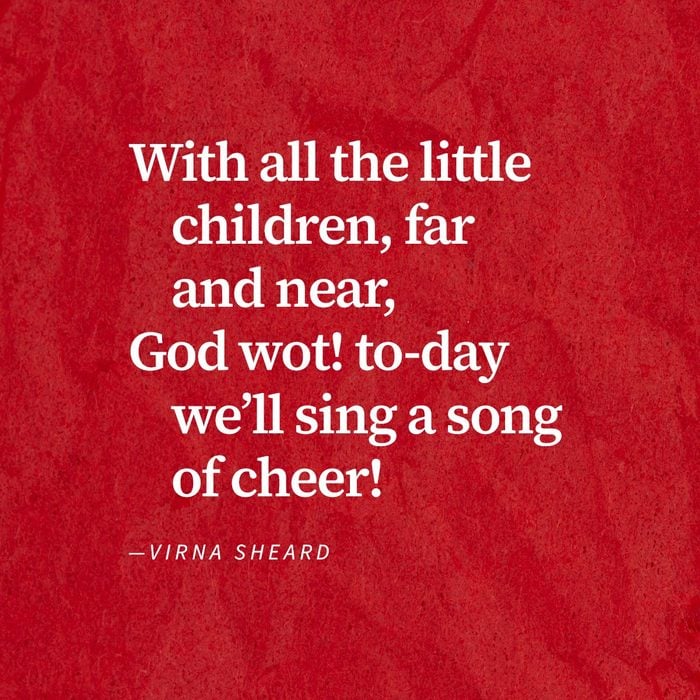
rd.com, Getty Images
8. “Christmas” by Virna Sheard
With all the little children, far and near,
God wot! to-day we’ll sing a song of cheer!
To rosy lips and eyes, that know not guile,
We one and all will give back smile for smile;
And for the sake of all the small and gay
We will be children also for to-day.
Holly we’ll hang, with mistletoe above!
God wot! to-day we’ll sing a song of love!
And we will trip on merry heel and toe
With all the fair who lightly come and go;
We will deny the years that lie behind
And say that age is only in the mind.
And to the needy, in whatever place,
God wot! to-day we’ll lend a hand of grace;
For where is he who hath not need himself,
Although he dine on silver or on delf?
And we who pass and nod this Christmas Day
May never meet again on life’s highway.
But when the lights are lit, and day has flown –
God wot! there will be some who sit alone;
Who sit and gaze into the embers’ glow,
And watch strange things that flitter to and fro –
The ghosts of dreams; and faces – long unseen;
Shadows of shadows – things that once have been.
Looking for inspirational poems around the holiday season? Canadian poet Virna Sheard delivers with the 1913 poem “Christmas,” which encourages adults to “be children also for to-day.” The poem serves as a reminder that life is short and that rather than sitting alone thinking about the past, we should embody the childlike cheer and innocence of the holiday, be kind to whomever we meet and appreciate what we have while we can.
![Except from poem "[Little Tree]" By E.E. Cummings on a green watercolour background](https://www.rd.com/wp-content/uploads/2023/12/15-Best-Christmas-Poems-to-Read-for-a-Festive-Holiday-Season_-little-tree-by-E-E-Cummings_GettyImages-1288894647_9.jpg?fit=700%2C700)
rd.com, Getty Images
9. “[little tree]” by E.E. Cummings
then when you’re quite dressed
you’ll stand in the window for everyone to see
and how they’ll stare!
oh but you’ll be very proud
and my little sister and i will take hands
and looking up at our beautiful tree
we’ll dance and sing
“Noel Noel”
Told from the perspective of a young child, the 1920 poem “[little tree]” uses E.E. Cummings’s iconic free verse and repetition to convey a sense of innocence and quiet warmth. The child talks to the small tree as if comforting an even younger child, personifying the tree and promising to take it home and decorate it so that it will be safe and beautiful. While American poet Cummings is most famous for his love poems for women, “[little tree]” remains a favorite among Christmas poems—Cummings even sent the (longer) full version of the poem as his Christmas card in 1960, four decades years after it was first published!
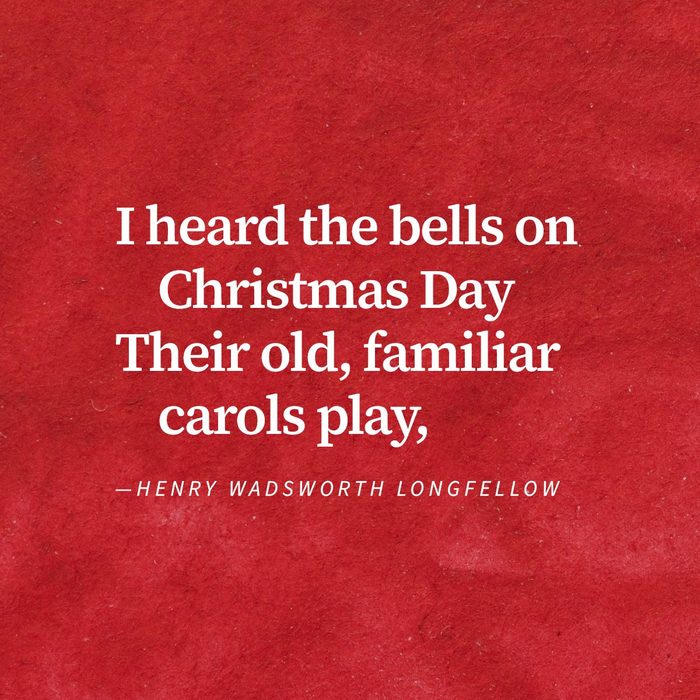
rd.com, Getty Images
10. “Christmas Bells” by Henry Wadsworth Longfellow
I heard the bells on Christmas Day
Their old, familiar carols play,
And wild and sweet
The words repeat
Of peace on earth, good-will to men!
American poet Henry Wadsworth Longfellow (1807–1882) is renowned for the musicality of his verses, and “Christmas Bells” is no exception. The 1863 poem—the first stanza is excerpted above—follows a narrator who hears the Christmas bells and bitterly notes the irony of sayings like “peace on earth, good will to men” during the Civil War. But the bells continue to ring like a sign from heaven, reaffirming to the narrator that there will be peace. “Christmas Bells” has since been adapted into one of the most famous Christmas carols.
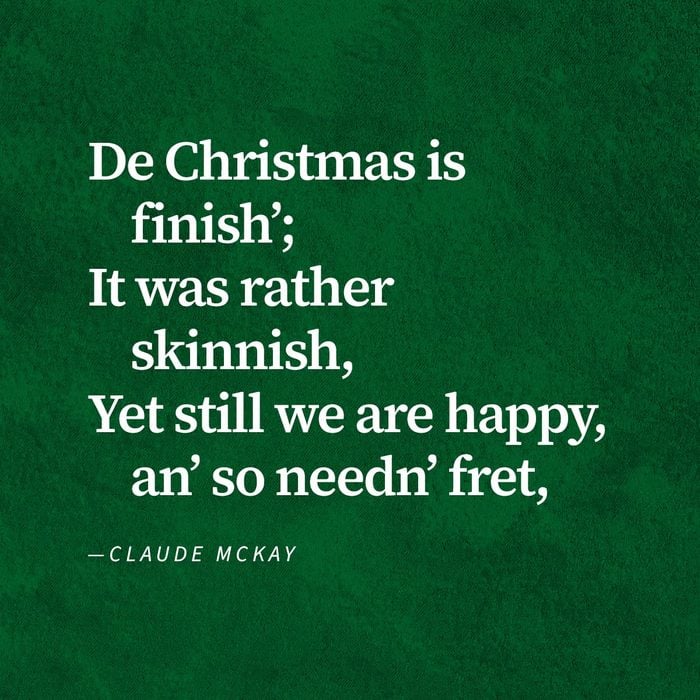
rd.com, Getty Images
11. “Out of Debt” by Claude McKay
De Christmas is finish’;
It was rather skinnish,
Yet still we are happy, an’ so needn’ fret,
For dinner is cookin’,
An’ baby is lookin’
An’ laughin’; she knows dat her pa owe no debt.
In his 1912 poem “Out of Debt,” Jamaican American and Harlem Renaissance poet Claude McKay writes from the perspective of a father who rejoices in being debt-free on Christmas and appreciates what his family does have, even if it may not be much. McKay often wrote in the Jamaican dialect, and while his poetry highlighted socioeconomic inequalities, it also celebrated the dignified lives in the Black community. The first stanza is excerpted above, but the full version of “Out of Debt” is worth a read.
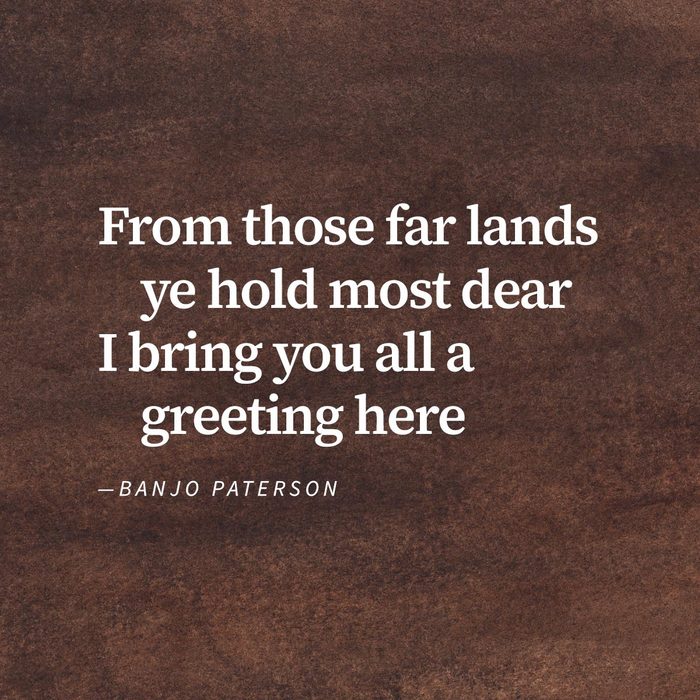
rd.com, Getty Images
12. “Santa Claus” by Banjo Paterson
No sign or countersign have I.
Through many lands I roam
The whole world over far and wide.
To exiles all at Christmastide
From those who love them tenderly
I bring a thought of home.
From English brook and Scottish burn,
From cold Canadian snows,
From those far lands ye hold most dear
I bring you all a greeting here
A frond of a New Zealand fern,
A bloom of English rose.
“Santa Claus” by Australian poet Andrew Barton “Banjo” Peterson (1864–1941) imagines a humorous scene in which a watchman tries to stop a “quaint old figure clothed in white” with a “staff of pine” and “ivy-wreath” from entering a military camp. Jolly Old Saint Nick tries to explain that he’s come to bring some holiday cheer, but the watchman may be a bit too good at his job. This Christmas poem is much longer than the two-stanza excerpt above, but you can read the full work to find out how it ends. Then check out these other funny poems!
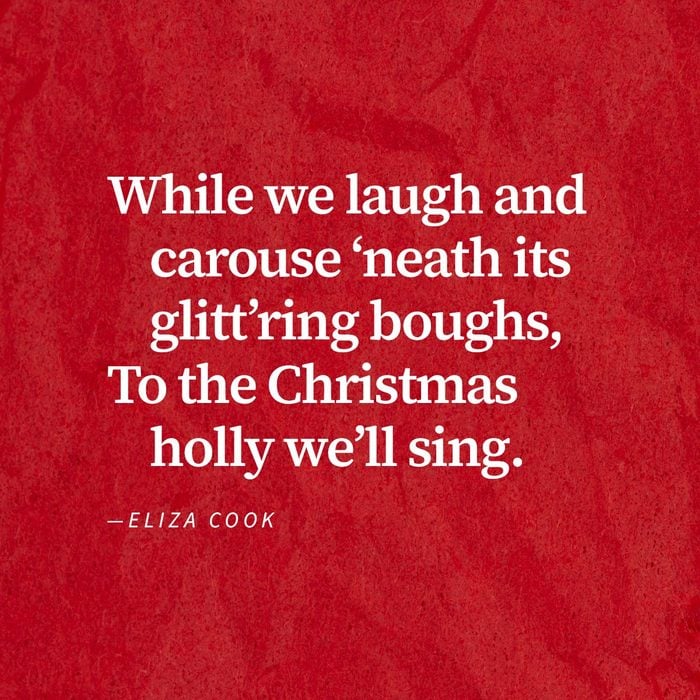
rd.com, Getty Images
13. “The Christmas Holly” by Eliza Cook
The holly! the holly! oh, twine it with bay—
Come give the holly a song;
For it helps to drive stern winter away,
With his garment so sombre and long.
It peeps through the trees with its berries of red,
And its leaves of burnish’d green,
When the flowers and fruits have long been dead,
And not even the daisy is seen,
Then sing to the holly, the Christmas holly,
That hangs over peasant and king:
While we laugh and carouse ‘neath its glitt’ring boughs,
To the Christmas holly we’ll sing.
With its beautiful green leaves and bright red berries that peek out from the snow, holly is an iconic symbol of Christmas, and Eliza Cook’s 1840 poem “The Christmas Holly” is an ode to the merriment that the plant can bring. The English poet came from a modest working-class family and was a huge advocate for women’s rights and access to education, openly defying gender and sexuality conventions. The excerpt above is just the start of this festive poem—be sure to read the rest of “The Christmas Holly.”
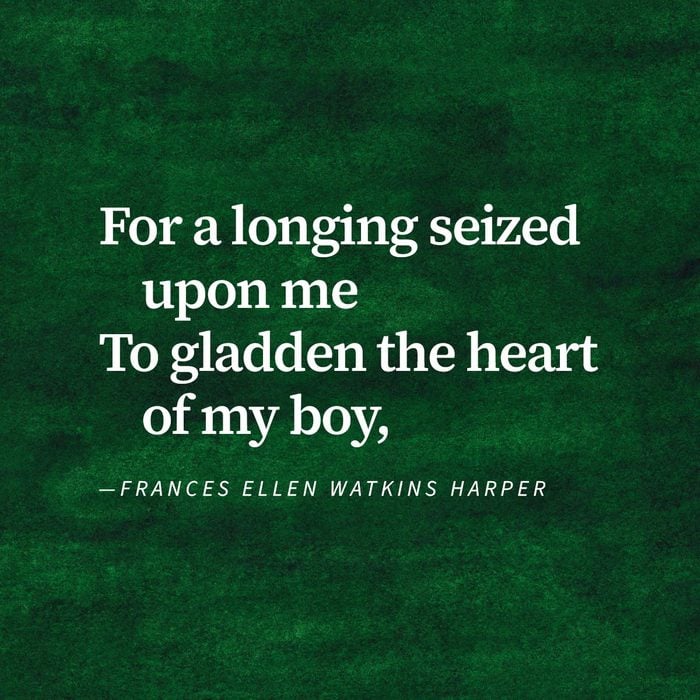
rd.com, Getty Images
14. “The Ragged Stocking” by Frances Ellen Watkins Harper
I began to search my pockets,
But scarcely a dime was there;
But scanty as was the pittance,
This stocking received its share.
For a longing seized upon me
To gladden the heart of my boy,
And I brought him some cakes and candy,
And added a simple toy.
One of the first African American women to be published in the United States, Frances Ellen Watkins Harper was a brilliant political activist, educator and poet. Her feminist, anti-slavery and temperance beliefs were often highlighted in her poetry, including “The Ragged Stocking.” In this 1901 poem, excerpted above, a drunk father quickly sobers up on Christmas Eve when he comes home to see his son’s stocking hanging over the chimney and realizes his son’s happiness is more important than drinking. You can read the rest of this beautiful and moving poem in Harper’s 1901 poetry collection Idylls of the Bible. And be sure to read these Amanda Gorman poems for a modern-day perspective on intersectional feminism and racial equality.

rd.com, Getty Images
15. “Christmas Conversion” by Jean Blewett
I smell Christmas in our kitchen,
An’ my heart gets big an’ glad,
An’ I, somehow, fall to wishin’,
That I wasn’t quite so bad.
An’ I tell myself I’ll never
Cheat at marbles any more,
Nor make faces at my teacher,
Nor hang round the corner store
There’s nothing like Christmas poems to remind children to be nice, lest they end up on the naughty list! Canadian poet Jean Blewett (1862–1934) plays with the idea of religious conversion with the poem’s title, but she tells the story from the humorous perspective of a boy who smells his mother preparing their delicious Christmas meal and decides then and there that he is going to behave better. The poem is longer than the excerpt above, so read the full poem to your kiddos for inspiration, and for more laughs, giggle your way through these funny limericks.